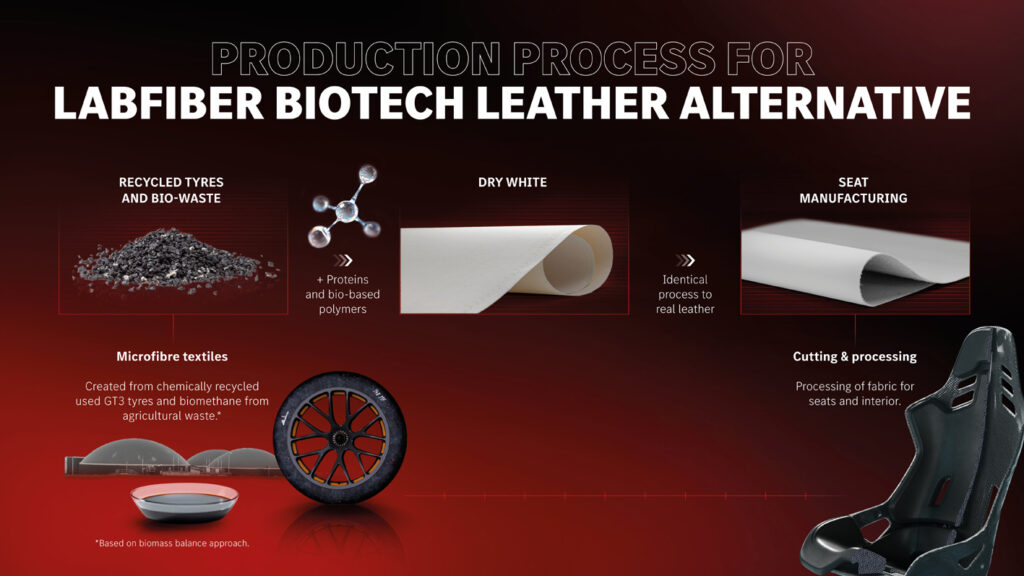
Animal-free leather startup Modern Meadow has signed a deal with auto giant Mercedes-Benz to develop an alternative material for its technology programme.
Mercedes-Benz has become the latest carmaker to attempt to ditch conventional leather, partnering with New Jersey biomaterial startup Modern Meadow on a new development deal.
The German car giant has used the latter’s Innovera material to create a cow-free alternative for its technology programme, Concept AMG GT XX. The aim is to further develop the material for series production.
The leather alternative, called LabFiber Biotech, combines chemically recycled AMG GT3 racing car tyres (conducted using the mass balance approach), plant-based proteins, and biopolymers.
“In our development partnership with Mercedes-Benz, we have used Innovera to create a new luxury leather alternative without sacrificing aesthetics, versatility and texture. It looks and feels as good as it performs,” said Modern Meadow CEO David Williamson.
From cultivated meat to animal-free leather

Modern Meadow started out as a cultivated meat company, founded by Andras Forgacs, Gabor Forgacs (who since went on to co-found cultivated pork startup Fork & Good), Karoly Jakab, and Francoise Marga. Cost barriers caused the company to pivot to lab-grown leather.
Earlier this year, the startup announced that Innovera, the plant-based material formerly known as Bio-Vera, would be its primary focus going forward. “By dedicating our resources to Innovera, we are positioning Modern Meadow to drive sustainable change and deliver the most advanced leather alternative available,” Williamson said at the time.
“This singular focus allows us to scale commercial production more efficiently, deepen industry partnerships, and ensure that designers and brands have access to a luxurious, high-performance material that is beautiful and better for the planet.”
According to the company, their animal-free material has more than 80% renewable carbon content and requires no special preservation or storage conditions, reducing its complexity and costs. In addition it’s adaptable to any standard manufacturing process, with its commercial production capabilities making Innovera readily available to customers across the furniture, fashion, footwear, accessories, and automotive industries.
“At Modern Meadow, we are redefining automotive interior possibilities with Innovera, our next-generation transformative material that brings beauty, performance and sustainability into perfect balance,” Williamson.
Why car makers are turning to animal-free leather

The Concept AMG GT XX provides an insight into an upcoming four-door sports car series from Mercedes-AMG, the auto giant’s high-performance subsidiary.
Each scrap tyre provides the base for about four square metres of the cow-free leather, while the black set pads of the bucket seats are covered with the Nappa-look variant. The material is breathable and waterproof, and lighter than traditional options. Plus, its maximum tensile strength is twice as high as that of conventional materials.
LabFiber Biotech was created using Modern Meadow’s technology and recycled racing cars used in tough competition on AMG GT3 customers’ racing cars. And since the material replicates key properties of the collagens found in leather, it offers the same level of design freedom and can be produced with different finishes (like nubuck, full grain, or suede), and in various colours and haptics.
This isn’t the first time Mercedes-Benz has decked a car’s interiors with animal-free leather. In 2022, it used mushroom and cactus leather, bamboo fibres, as well as biofabricated silk in the Vision EQXX concept EV.
It is among several automakers embracing such materials. Last year, General Motors unveiled a concept EV under its Cadillac division, which used mycelium-based materials from Californian startup MycoWorks.
Producing leather is an energy– and water-intensive process linked to deforestation and biodiversity loss, and generates lots of hazardous chemicals during tanning, which are a detriment to human health. It also has a much higher carbon footprint, at 110kg of CO2e per square metre, compared to synthetic and plant-based alternatives.
That said, synthetic leather often contains plastic, which itself is responsible for 3.4% of global emissions (a share set to double by 2060). Plastic takes between 20 to 500 years to break down and decompose, and these leather alternatives shed toxic microplastics that can enter waterways, thus harming aquatic life, the food system, and human health.
With an increasing number of manufacturers looking for animal-free and plastic-free leather alternatives in order to reduce their climate impact, companies like Modern Meadown are gaining traction. Other sustainable leather innovators include Faircraft, Lab-Grown Leather, 3D Bio-Tissues, Qorium and Pelagen.
The post Mercedes-Benz Embraces Cow-Free Leather with Modern Meadow Partnership appeared first on Green Queen.
This post was originally published on Green Queen.